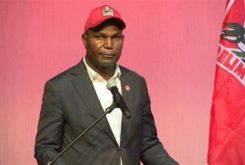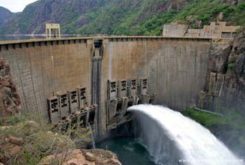The future of Mozambique’s economy and even the financial situation of the state is very dependent on the liquid natural gas (LNG) projects in the Rovuma Basin of Cabo Delgado province.
Recent instability in the region has enhanced the risks facing the country.
Despite stronger security measures imposed by Mozambican authorities, in recent months Islamist armed groups have mounted successive attacks, mostly against civilians, causing nearly 40 deaths and destroying around 300 dwellings and administrative buildings.
Sector sources have indicated that expatriate personnel of Anadarko (leader of the consortium in charge of exploiting Area 1) are being withdrawn from its base in Palma, and that only a residual team should remain in the region.
Security for ExxonMobil, which participates in Area 4, is also being reorganised to boost protection measures. The few expatriate citizens have already returned to Maputo.
Consular warnings for foreign citizens issued by the diplomatic corps in Maputo have also multiplied, especially from the United States, the country of origin of two of the main oil companies involved in the LNG projects.
The respective industry’s development in this Portuguese-speaking Africa country counts the participation of major energy companies from China (CNPC) and other Asian countries, which should be the main markets for Mozambican LNG. It is also at the core of the middle and long-term strategy of ENI, ExxonMobil and Anadarko.
In March of last year ExxonMobil closed a deal to acquire 25 percent of Area 4 (Rovuma offshore) by buying 35.7 percent of ENI East Africa, emerging in time as the main entity responsible for building and operating the onshore LNG processing units.
Those units include Afungi, an LNG processing unit being built in the Palma district, and the Prosperidade-Mamba complex held by Anadarko and ENI, a project known as Mozambique LNG negotiated by the concession holders for Areas 1 and 4 of the Rovuma Basin, represented by Anadarko Moçambique Area 1 and ENI East Africa and signed in December 2012. Plans also call for the two areas to share use of the natural gas storage and processing unit.
Increased security risks may eventually delay Anadarko’s investment in Mozambique, despite ExxonMobil’s manifest commitment to Mozambican gas, as confirmed by the sale of 35 percent of its share in Tanzania (bloc 2, offshore).
Mozambique’s estimated gas reserves (85 trillion cubic metres) are nearly three times more than those found in Tanzania.
Although it is in the process of closing deals to sell production, Anadarko has yet to make its final investment decision. It is counting on Exxon acquiring a position of 26.5 percent in Area 1 (Rovuma offshore), our sources indicate.
In May 2017 the government approved the terms and conditions of concession contracts to prospect for and produce hydrocarbons (LNG and petroleum), specifically addressing operations in the Rovuma Basin, under the responsibility of the consortium that manages the Coral FLNG project in Area 4 (ENI, CNPC, Galp, ENH, Cogas and ExxonMobil) along with Anadarko and six other partners in Area 1 (Prosperidade, Atum and Golfinho complexes).
This region’s strategic relevance also goes beyond the interests of Anadarko, Exxon or ENI. Projects to supply energy to the countries of the African hinterland such as Tanzania, Botswana or Zimbabwe may pass through Mozambique.
The gas to be produced in the Rovuma Basin will be the main source of supply, under the leadership of South Africa, already a client of Mozambican gas.
A scenario that delays foreign investment in the hydrocarbon sector may have a major impact on the Mozambican economy, which depends on the Cabo Delgado gas projects getting under way, given the financing limits imposed by creditors.
Foreign direct investment (FDI) in Mozambique has been falling since 2013, when it reached US$6.175 billion. In 2017 it only amounted to US$2.293 billion, mostly sustained by ExxonMobil’s purchase in the Area 4 project (Rovuma Basin) and the acquisition by Japan’s Mitsui of the stake held by Brazil’s Vale in the Moatize mines and Nacala Logistics Corridor.
That situation led to a shortage of foreign currency and lower export revenues, with corresponding social impact. GDP growth estimates for 2018 and 2019 are now 3.2 percent and 3.4 percent respectively, less than half the forecasts of 8.3 percent and 7.6 percent made before the revelation of ‘hidden’ debts.
The hydrocarbon sector is still the mainstay for entry of foreign currency in the country: in 2016 South Africa’s SASOL led FDI with a project to link Mozambique and that country as part of the strategy to diversify supply sources. The respective investment amounted to US$760 million, nearly ten times more than in 2015.



